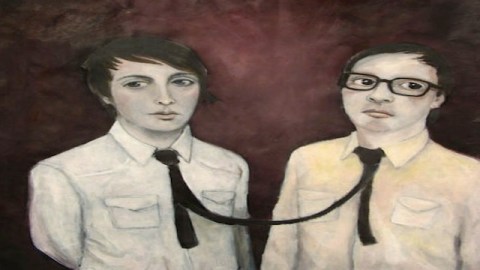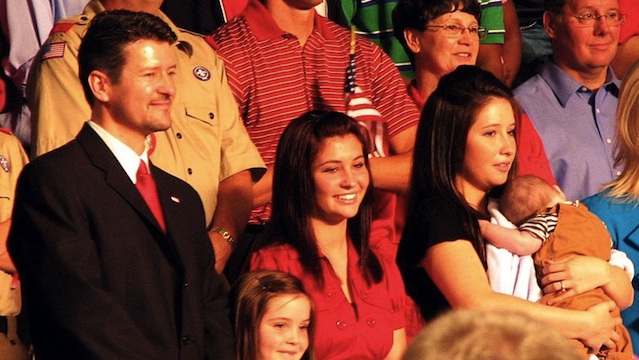Study: Your Genes Help Pick Your Friends

How much of you resides between your ears? And how much of what you call “me” is made outside your body, in your relationships with others? Biologists have largely confined themselves to aspects of the mind that can be measured in a single human body (galvanic skin response, activity in the amygdala, cortisol levels, etc). The rest of what makes up a person—culture, politics, the influence of parents and friends—is for the “soft sciences.” It’s easy to scoff at this “methodological individualism,” but hard to do rigorous experiments without it. Still, a lot of the mind (languages, moral codes, “lifestyle”) is actually a shared experience, and some scientists would like to take that into account. This week’s example: This paper, whose results suggest that people prefer friends who share the same version of a particular gene.
The study, published Tuesday in the online version of the Proceedings of the National Academy of Sciences, is by network theorists James H. Fowler, Jaime E. Settle and Nicholas Christakis. In two large medical databases that permit researchers to track both friendship networks and genetic facts, the authors found a correlation between friendship and possession of a particular version of a single gene. Actually, they found two, if you count inverse correlation (which they did).
The correlated gene is DRD2, which codes for a protein the responds to dopamine. People’s friends were more likely to have the same variation of this gene than chance would dictate, even after controlling for gender, ethnic ancestry and other possible confounds. Conversely, the authors report, a gene called CYP2A6, which codes for one of the proteins involved in processing nicotine, showed the opposite effect. Each person’s friends were more likely to have a different version of that one.
It’s striking that the correlation turned up into two different, unrelated bodies of data. One was the Framingham Heart Survey (which has monitored thousands of people’s health and behavior since 1948), the other the National Longitudinal Study of Adolescent Health (a nationwide survey of high school students’ health-related behavior conducted in the mid 1990’s).
However, it’s also striking that the effect was found for only two genes, and that the authors only looked at six. As Amy Maxmen reported in Nature, state of the art in genetics-behavior studies is to look at many more genes than this (and to look, on each gene, at more than one nucleotide, which this study didn’t do either). And why would DRD2 seek out its exact copies, while CYP2A6 prefers its owner to hang with different versions of itself? (The paper says DRD2 “has been associated with alcoholism,” but the link is controversial; as for CYP2A6, as the authors write, it has been associated with “the trait of openness” in a single Japanese study of smoking behavior. Those aren’t slam-dunk links.)
Geneticists who talked to Maxmen were not impressed. Said one: “If this was a study looking for shared genes in patients with diabetes, it would not be up to the standards of the field.”
Still, it’s an interesting paper, even if, as usual, Further Research Is Needed. If the correlation holds up, it could lead to a new way to talk about the link between genes and behavior. If Fowler et al. are right, you’re actually the product of your genes plus the genes of people you associated with. If they’re right, we also have a means to replace that fuzzy assertion with a precise map: Which genes, which friends.
Right now most evolutionary explanations of human behavior assume that the only genes directly influencing you are your own, and those of close relatives (who have more copies of your genes than the average stranger, and so are worth your help). But people are obviously willing to cooperate with, and sacrifice for, complete strangers. To explain that, theorists invoke second-order mechanisms: I help you now because you will help me tomorrow; I help you to look good to future mates; I help you because my genes have been fooled by culture into thinking you are my brother.
Maybe those will suffice; but maybe, this study’s authors suggest, it’s time to supplement the individualist perspective. “We could possibly view an individual’s genetic landscape as a summation of the genes within the individual and those around him,” write Fowler et al. (emphasis mine).
So, for instance, “some individuals might be ‘immune’ to whatever pathogen is spreading in a population not because of their own constitution, but rather because they have come to surround themselves with others with particular genotypes,” the authors explain. Or non-drinkers may be drawn to other non-drinkers genetically, adding a layer of protection against alcoholism.
This non-individual perspective leads to the thought that “natural selection could perpetuate traits that are favorable not to an individual but to a social unit such as a flock or a colony, or to an entire species, or even to an ecosystem made up of many species,” as David Sloan Wilson and Edward O. Wilson put it here (pdf). This idea, once anathema in biology, has been revived by the first Wilson, who persuaded the second a few years ago.
Its critics still complain, though, that once scientists abandon the individual perspective, they don’t have any clear boundaries. How are you supposed to define the “group” whose genes are in competition with others, if a “group” can be a flock, a neighborhood, or a swamp?
Racists answer that the groups are ethnic or racial—that people just prefer “their own kind.” Cooperation across racial lines gives the lie to that idea. So does this new paper, because Fowler et al. controlled for genetic similarity due to shared ancestry. The DRD2 “homophily” they found among friends wasn’t racial. So, given that human beings belong to many different “groups,” from neighborhoods to congregations to cities to nations to religions, how are we to define the groups that select genes?
Fowler et al.’s approach, if it is born out, would be a better answer: The groups would be networks, and you’d find them by asking people who their friends were. End of boundary-finding problem. And end of another problem that has dogged group-selection ideas in the past: The suggestion that biology can and should confirm bigotry based on race or religion or nationality. For all the lack of enthusiasm from geneticists, then, this is still a mighty interesting paper.
Fowler, J., Settle, J., & Christakis, N. (2011). Correlated genotypes in friendship networks Proceedings of the National Academy of Sciences DOI: 10.1073/pnas.1011687108
Illustration:
By _bobi bobi illustration © from France (Friendship, etc.), via Wikimedia Commons





